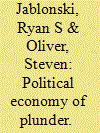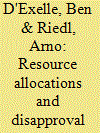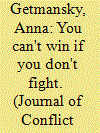|
|
|
Sort Order |
|
|
|
Items / Page
|
|
|
|
|
|
|
| Srl | Item |
| 1 |
ID:
121848


|
|
|
|
|
| Publication |
2013.
|
| Summary/Abstract |
This article introduces the Continent of International Law (COIL) research project on international agreement design. COIL stems from the conviction that the International Organization subfield's focus on the couple hundred international organizations with physical headquarters had to be broadened to include the tens of thousands extant international agreements, that is, international law. Each piece of international law can and should be studied as an institution. Together, this set of institutions, which truly is a "continent," is theoretically very interesting and empirically very diversified. COIL's basic theoretical premise is that international agreement design and comparison across agreements begins by understanding the underlying cooperation problem(s) the agreements are trying to solve. COIL identifies 12 distinct and recurrent cooperation problems, which may occur alone or in combinations. The data collection features a random sample of international agreements conditional on the issue areas of economics, environment, human rights, and security. The first large-n, systematic operationalization of the cooperation problems underlying real international agreements is highlighted, and descriptive statistics are presented - some of which challenge conventional wisdom. For instance, enforcement problems (Prisoner's Dilemma-like situations) are important, but far from universal, with 30% of the agreements characterized by that underlying problem. The numerous and diverse COIL variables allow for a multi-dimensional operationalization of the difficult-to-measure concept of the "incomplete contract." Hypotheses from contract theory are tested, confirming the appropriateness of the new measure, the weakness of measures based on number of pages, and most significant, the rationality and efficiency of the continent of international law.
|
|
|
|
|
|
|
|
|
|
|
|
|
|
|
|
| 2 |
ID:
121844


|
|
|
|
|
| Publication |
2013.
|
| Summary/Abstract |
This study presents a systematic transcript-based analysis of the dialogue occurring in a track two workshop attended by Jewish-Israelis and Palestinians. We hypothesized that participants from conflicting groups would form a shared superordinate identity in the course of the workshop. Our findings confirmed this hypothesis. Consistent with self-categorization theory, we demonstrate that the observed Jewish-Israelis and Palestinians mutually identified with the peacecamp, a collection of people and organizations that promote dialogue and conflict resolution efforts. In line with our expectations, and in contradiction to previous findings concerning communication between groups in conflict, participants demonstrated patterns of cooperative, counter-ethnocentric interaction. Through the paradigm of social identity theory, we explain these phenomena as the result of the participants' salient superordinate peacecamp identity. The study's findings offer an innovative theoretical contribution to the common ingroup identity model, showing that the reduction of intergroup bias can actually hinder the effectiveness of conflict resolution efforts. Specifically, by forming a superordinate identity, the observed participants are left less able to represents the needs, demands, and claims of their respective national groups and, hence, less able to produce ideas acceptable to their respective publics. The study also offers a practical contribution to the field of track two diplomacy, empirically verifying Hebert Kelman's assertion that when facilitators allow participants to form a cohesive group, they risk damaging both the quality of the workshop's ideas and the participants' ability to influence their leaderships (Rouhana and Kelman 1994; Kelman 1999, 2002).
|
|
|
|
|
|
|
|
|
|
|
|
|
|
|
|
| 3 |
ID:
121845


|
|
|
|
|
| Publication |
2013.
|
| Summary/Abstract |
Mediation is a popular process to prevent conflicts over common resources, but there is little clean insight into its effectiveness and mechanisms. Our experimental approach allows for a comprehensive analysis of third-party intervention into potential conflicts and circumvents key problems linked to the analysis of field data. A mediator who credibly threatens punishment in the case of uncooperative behavior achieves the efficient solution in most cases. Similar results are obtained even if the mediator is biased toward one party or has no incentive to intervene. When cooperation fails, communication without credible punishment threats leads to particularly low payouts for the "losing" party.
|
|
|
|
|
|
|
|
|
|
|
|
|
|
|
|
| 4 |
ID:
121849


|
|
|
|
|
| Publication |
2013.
|
| Summary/Abstract |
Maritime piracy is a growing scourge on the international community-imposing large costs on maritime states and the shipping industry, as well as potentially undermining state capacity and funding terrorism. Using original data on over 3,000 pirate attacks, the authors argue that these attacks are, in part, a response to poor labor market opportunities. To establish this, the authors take advantage of the strong effect of commodity prices on labor market opportunities in piracy-prone states. Consistent with this theory, the authors show that changes in the price of labor- and capital-intensive commodities have consistent and strong effects on the number of pirate attacks in a country's territorial waters each month. The authors confirm these results by instrumenting for commodity prices using monthly precipitation levels.
|
|
|
|
|
|
|
|
|
|
|
|
|
|
|
|
| 5 |
ID:
121846


|
|
|
|
|
| Publication |
2013.
|
| Summary/Abstract |
Considerable resources are devoted to ex-combatant reintegration programs in current peace processes, but evidence on their effectiveness remains thin. We use original survey data to study an ex-combatant reintegration program implemented after Burundi's 1993-2004 civil war. Previous quantitative studies have found reintegration programs to be ineffective, but only ex-combatants who self-selected into programs were studied. We avoid such selection problems with a quasi-experimental design exploiting an exogenous bureaucratic failure. We find the program resulted in a 20 to 35 percentage point reduction in poverty incidence among ex-combatants and moderate improvement in livelihoods. But this economic boost does not seem to have caused political reintegration: while we find a modest increase in propensities to report civilian life as preferable to combatant life, we find no evidence that the program contributed to either more satisfaction with the peace process or a more positive disposition toward current government institutions.
|
|
|
|
|
|
|
|
|
|
|
|
|
|
|
|
| 6 |
ID:
121847


|
|
|
|
|
| Publication |
2013.
|
| Summary/Abstract |
Resources are often allocated in groups through decentralized nonmarket mechanisms. We experimentally investigate groups where a rich representative allocates resources among poorer members, who can announce disapproval by voting for a measure hurting the representative. We examine the effect of inequality aversion by keeping information on the allocation private in one and commonly known in another condition. Further, we investigate whether casting votes publicly or secretly influences allocation and voting behavior. We find that disapproval rates are highest with secret voting or a commonly known resource allocation. Disapproval voting fails to stimulate representatives to appear more prosocial, but rather induces them to keep everything. Private information on the allocation and public voting leads to least disapproval and exclusion of the poorest group members from the resources. The analysis shows that inequality aversion of poorer group members crucially interacts with the investigated institutional and informational details of the resource allocation situation.
|
|
|
|
|
|
|
|
|
|
|
|
|
|
|
|
| 7 |
ID:
121850


|
|
|
|
|
| Publication |
2013.
|
| Summary/Abstract |
What effect, if any, does democracy have on outcomes of counterinsurgency wars? Previous studies have provided inconclusive answers mainly because of the challenges involved in testing the question empirically: First, insurgencies are not accidental and the anticipated outcomes also affect whether they break out in the first place. Second, regimes are non-random and their determinants can also affect insurgency incidence and its outcomes. Moreover, different aspects of democracy can have opposite effects on the government's chances of winning. I address these challenges by conducting a critical test to distinguish between different causal mechanisms. I find that domestic institutions that are associated with public goods provision make insurgency onsets less likely. I also show that once we control for this selection effect, domestic political institutions do not influence insurgency outcomes.
|
|
|
|
|
|
|
|
|
|
|
|
|
|
|
|
|
|
|
|
|